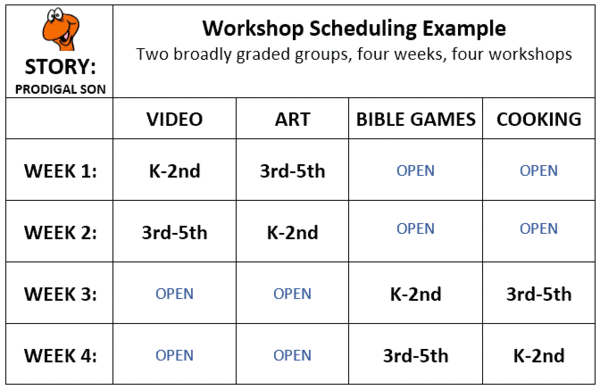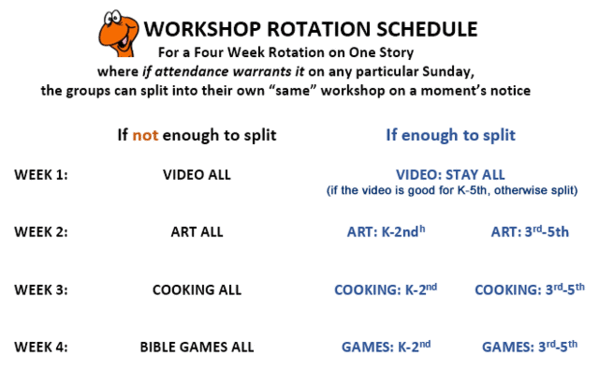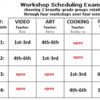Creating a 4 or 5 Week Rotation Schedule
for 1 to 5 Rotating Age Groups
Concepts, ideas, and scheduling examples for all sizes of Sunday School.
- Read our article about Which Stories to Teach (also known as a 4 or 5 year "scope and sequence.")
- See other Online Video Presentations about the Model.
Here's apresentation showing various Workshop Rotation scheduling options...
Key Point:
Rather than always following the same schedule formula for every story or time of year, Rotation modelers take into consideration how the upcoming story, their creative ideas, expected attendance, room availability, and what the church calendar is doing, to decide what to teach, when to teach it, which workshops to use, and which grades might go to which workshops FIRST in the rotation.
For example...
An Advent story rotation schedule might only have three weeks due to special Advent programming, whereas the January rotation on Good Samaritan might have four or five weeks of workshops.
A spring rotation schedule might combine 5 grade groups into 3 rotating groups due to lower attendance.
You might schedule four workshops per story, but only have enough kids to form two rotating groups -- meaning two of your workshops will not be in use on any given Sunday.
Or you may have a "one room" Sunday School with only three or four children, in which case your one room can function as a different workshop each week (perhaps with different teachers each week but the same "shepherd" to the kids being there every week).
Here are some schedule examples we created for the online presentation "Rotation Schedules" found here at Rotation.org.
This first example is a pretty typical schedule. The workshops can be changed, of course.
This second example rotates 3 groups through 4 weeks and workshops.
This third example below shows just 2 groups rotating through 4 workshops. It shows how you could add a fifth week for "all groups" or for other workshops. The schedule also shows how you can have just two classrooms functioning as four workshops if necessary.
or...
Below is an example of 5 grades rotating through four or five different weeks through five workshops. If you have 5 groups rotating for just 4 weeks, that means each grade "misses" a certain workshop. Which ones you have them miss is your choice.
Here's a Rotation Schedule for Very Small Sunday Schools
...where attendance fluctuates week to week leaving you "not enough kids" for two classes on some Sundays.
The assumption here is that "splitting" into two different age groups is always better for the kids when you have enough kids to create two functional classes.
What's a functional minimum? That depends on your activities and ages of your kids, but TWO kids per workshop is a good minimum. That means if you have three kids in attendance, you should usually group them together.
- If you have four or five and they're all nearly the same age group, keep them together.
- If you have four or more, and some are very young, and some are very old, then you'll probably want to split them.
The key strategy in the "Split or Combine" Schedule is to have two teachers plan for two identical but age-grouped workshops. Then on each Sunday you see who is in attendance and split or combine accordingly.
The reason you plan and teach two identical workshops in this "Split or Combine" scheduling trick is so that regular attenders get a new type of workshop each week no matter whether they were combined or split the week before.
 See a video clip that explains how to "split or combine" groups on a moment's notice each Sunday when attendance is small and unpredictable.
See a video clip that explains how to "split or combine" groups on a moment's notice each Sunday when attendance is small and unpredictable.
The 4 or 5 Week "Stay on the Story" Consensus
After several decades of Rotation experience in a variety of settings, it is the general consensus of the Rotation community that "4 or 5 weeks per story" is the right number of weeks for most stories and Sunday Schools. This number is recommended regardless of how many grade groups or workshops you have. See "exceptions" below.
This consensus applies to whether you have 3 kids or 103. Six or more weeks on the MOST stories is challenging and probably unnecessary. Some stories like the Exodus or Holy Week can be done over a 6 to 10 week period because they have different stories within them.
Why 4 or 5 weeks?
Because the average student isn't there every week, and we want to expose the average attender to at least three weeks on the same story so that it "sinks in." Those who DO attend more regularly do not get bored because they are attending a different workshop each week. More regular attenders learn more.
Whether you choose to do 4 or 5-week story rotations is your choice. It can depend on your kids' attendance patterns, the needs of the story, or your church calendar. For example, most would probably agree that the Ten Commandments needs all of 5 weeks, if not 6. Whereas, Advent or the Last Supper only need 4, ...because these stories are regularly reinforced in worship.
At a minimum, most Rotation Modelers believe "if it is worth teaching, it is worth teaching for at least 4 weeks." If you have a large group of irregular attenders, then you may need to cover most stories for 5 weeks at a time in order to "catch" each irregular attender at least twice during each rotation. It's your decision.
Exceptions:
Some special rotation stories might warrant 6 weeks, such as, the Ten Commandments. It can depend on how much of the story you want to cover in one rotation. The Rotation.org Writing team's Red Sea-Wanderings lesson set has an alternative back-to-back rotations on that large story.
It's not unheard of to do only 3 week rotations for Advent and Easter stories, depending on your church's scheduling needs. These stories tend to be well-known and get plenty of coverage in other parts of the children's church experience as well.
How to Fit 6 Grade Groups Into a 5 Week Schedule
Just because you have six different grade groups rotating among your 6 workshops does NOT mean you have to do a 6 week rotation. You can still schedule 4 or 5 weeks for a story. It just means that each of your grade groups will miss one or two of the workshops for that story.
If you're going to have certain groups skip certain workshops, pay close attention to which workshops might be "best" for certain age groups to miss. For example, younger can miss Computer more often because you may have less software for their age group. Whereas, you might have your oldest grade skip Cooking. Your choice, and it can entirely depend on what your lesson ideas and resources are for that particular rotation.
(This "6 groups/6 workshop but only 5 weeks" may seem obvious to some but isn't always immediately understood by new Rotation churches.)
About Scheduling the Video Workshop
Most Rotationers will try to put the younger grades into the Video Workshop on the 1st week so that they can "see the whole story" early in the rotation. Video is particularly good at helping students acquire a big story's outline. Whereas, the Art workshop tends to focus on one aspect of the story, rather than the storyline.
Alternately, some Rotation churches routinely combine several grade groups on the first week of a new rotation to show the video, and then split into grade groups after the video to discuss it. This works particularly well if you have the space, and a particular video with a broad age-range.
See an example schedule below which demonstrates combining grades for video, and then turning the video workshop into a drama workshop for the rest of the rotation.
Scheduling Certain Workshops for Certain Grades Only
Some Rotation churches schedule specific workshops for certain grades only. For example, it's common to have the K's and 1st graders skip the Computer workshop due to the relative lack of software for that age. This is sometimes done for Drama workshop as well, if the drama lesson plan is developmentally too much of a stretch for younger kids. Instead, the schedule might include a substitute workshop for that grade, replacing Drama or Computer with Cooking, for example.
Which Workshops to Schedule?
The four "classic" and most often used workshops are:
Most Rotation churches at some point will bring in a COOKING or COMPUTER or MUSIC, or SCIENCE/STORYTELLING workshop as an "occasional" workshop option. You'll often see our Writing Team lessons the inclusion of MUSIC with the Drama Workshop, or the creation of a video in the Drama Workshop.
Some Rotation churches incorporate "story" and "music" into their Drama Workshop. How you choose to define these core and extra workshops is usually a function of your resources and interests.
On rarer occasions, as you look at a certain story or workshop idea, you may find that you'd like to have TWO weeks in one workshop. (This is where your scheduling can get really creative and complicated!). Some older children's art projects, dramas, or software, for example, might be best used two weeks in a row by the same group.
And for some story rotations, you might get inspired to combine workshops, such as, Art and Drama, --if the art project, for example, is going to be used in the drama.
And then there are different churches interpretations of what you DO in a workshop. For example, the Video/A-V Workshop was originally conceived of as a place where you can also MAKE a Video, ....which is more like drama. The Point: workshops are flexible.
Read the article about "SMALL ROTATION SUNDAY SCHOOLS, FEW KIDS" at https://www.rotation.org/topic/...ll-churches-few-kids.
It has some schedule examples in it as well.
In Conclusion
Adapting your Rotation Schedule to your teaching needs, preferences, calendar, rooms, and inspirations is one of the things that attracts Christian Educators to this model.
The Rotation Model believes Bible literacy in Sunday School only comes through focusing on the story over a multi-week period ("rotation"), and that children and their lesson memories are best nurtured by creatively teaching through a variety of approaches ("workshops").
Our approach to scheduling enables us to ACT on those beliefs, while giving us the flexibility to work with the church calendar.
<>< Neil
for rotation.org
You are welcome to reply to this article and submit your own schedule examples.









